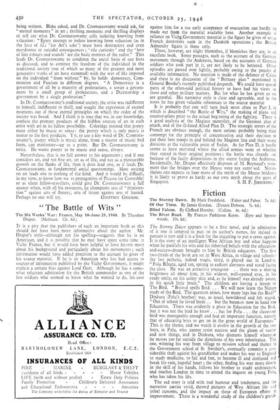" The Battle of Wits "
IT is a pity that the publishers of such an important book as this should not have been more informative about the author. Mr. Draper's style—although not his spelling—suggests that he is an American, and it is possible that he may have spent some time in Vichy France, but it would have been helpful to have known more about his background and partigularlv about his movements ; such information would have added precision to the account he gives of his source material. If he is an American who has had access to sources of information published by the Vichy Government, it might explain a certain bias against Lord Gort. Although he has a some- what reluctant admiration fcr the British commander as one of the few soldiers who seemed to know what he wanted to do, his case
against him for a too early acceptance of evacuation can hardly be made out froril the material available here. Another example If reliance on Vichx_Government material is the figure he gives of seven French destroyers sunk in the Dunkirk operations ; the British Admiralty figure is three only.
These, however, are slight blemishes, if blemishes they are, in an excellent book. Some passages, such as the account of the German movement through the Ardennes, based on the accounts of German soldiers who took part in it, are not likely to be bettered. Other episodes are passed over lightly, probably owing to the paucity of available information. No mention is made of the defence of Calais and there is no discussion of the " Brittany plan" mentioned in General Brooke's recently published despatch. We could have spared parts of the often-told political history to have had his views on these and other military matters. But for what he has given us we are grateful. His narrative style is clear and agreeable, and in the notes he has given valuable references to the source material It is probable that one will turn back most often to Part I, in which is described " the Battle of Wits," the making of plans and counter-plans prior to the actual beginning of the fighting. There is a good analysis of the Maginot mentality, of the German plan of attack, and of the ill-fated Allied Plan D. The strategic errors of the French are obvious enough, the most serious probably being their contempt for the principle of concentration and their decision to put their best troops in and behind the Maginot line and their worst divisions at the vulnerable point of Sedan. As for Plan D, it hardly seems to have mattered where the allied armies went or whether they stayed in their original positions ; the battle was already zast because of the faulty dispositions in the sector facing the Ardennes. Incidentally, Mr. Draper effectively disposes of M. Revnaud's state- ment that the bridges over the Meuse were not surpfsed. Never- theless one expects to hear more of the myth of the Meuse bridges ; it is likely to prove as hardy as our own myth about the guns of






























 Previous page
Previous page